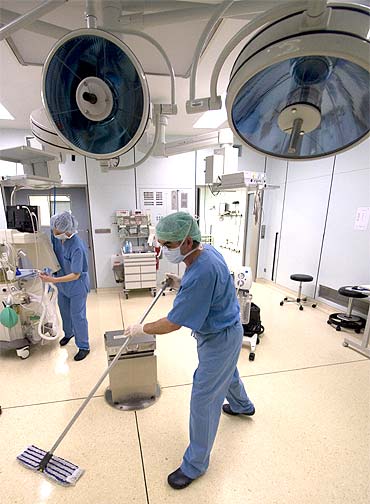Photographs: Fabrizio Bensch/Reuters Vicky Nanjappa in Bengaluru
British scientists recently tracked a drug-resistant superbug, the NDM-1, which is said to infect patients who have recently undergone medical procedures, in India
"The NDM-1 strain has developed a resistance to all antibiotics, and is believed to be caused by the overuse of drugs and antibiotics. India has a long history of prescription drug abuse and hence it is feared this bug could cause huge trouble in India," says Dr Rajeshwari.
'Self-medication has led to a drop in immunity'
Image: The MRSA 'superbug' bacteria strainPhotographs: Fabrizio Bensch/Reuters
"Now that we face this problem, doctors have to tread with care while treating such patients. They need to be identified and isolated. The rooms given to them should have a separate toilet. Their linen has to be washed separately since this bug could spread through clothing.
"The government should help provide more facilities in all hospitals, so that the labs are able to identify the problem. Identifying it is the biggest challenge we face today. Also, all hospitals should ensure hospital infection control, which is not very prevalent in the country today," she adds.
'The must be a policy on antibiotics'
Image: Staff disinfect the operating theatre of a Berlin hospital after an procedure on a patient with MRSAPhotographs: Fabrizio Bensch/Reuters
For the rest of the public, what I would suggest is cleanliness and regular hand-washing," says Dr Rajeshwari.
"Moreover, people should take utmost care in consuming antibiotics. When at a doctor's place, you need to ask questions about the antibiotics prescribed. The common man has to question the doctor, however much he or she trusts him. The general tendency is not to question the doctor. This would help change the prescription habits of doctors to a large extent
"On the part of the government, there has to be a policy on antibiotics in place. In bigger hospitals the head of the staff can instruct the doctors under him or her to change the prescription policy. What about smaller hospitals or nursing homes where there is just one doctor? Who can regulate his prescription pattern? It is in such cases that a policy is needed," she signs off.




article